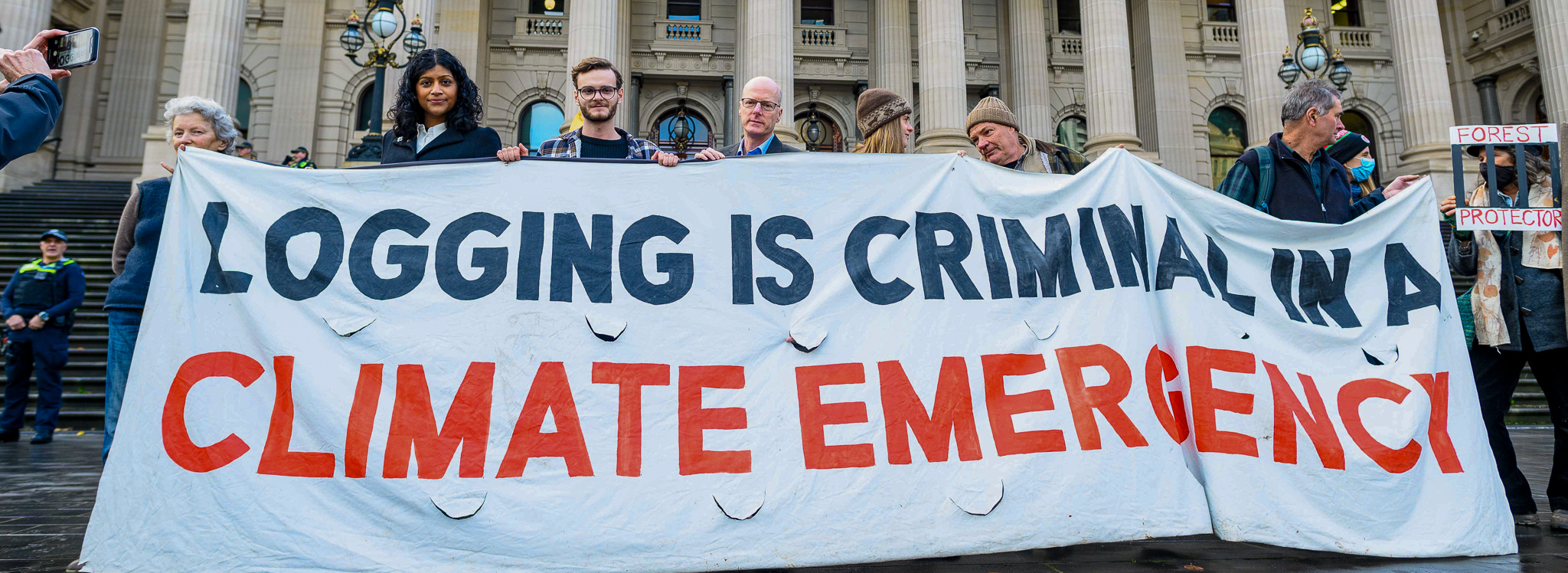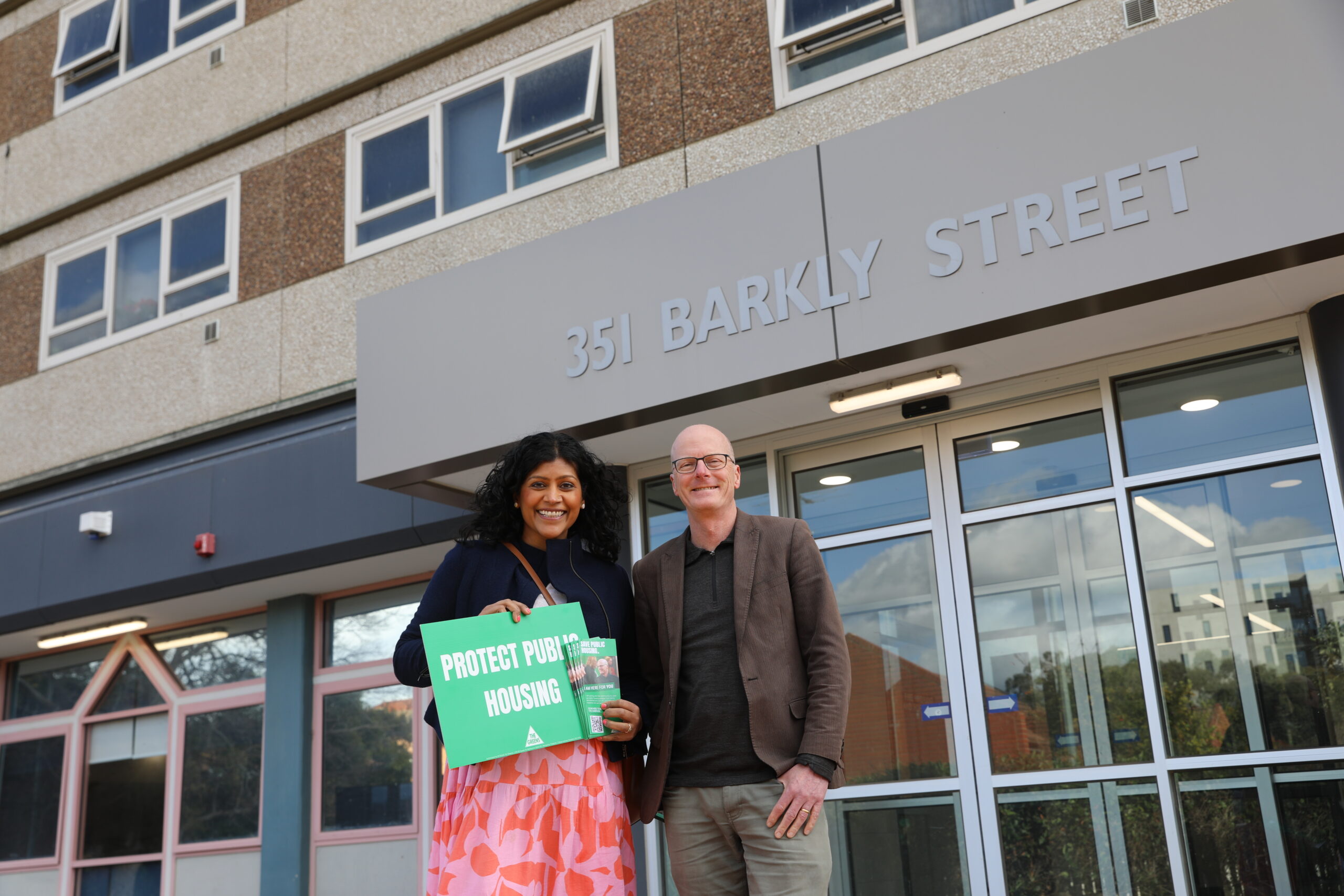Recently in parliament I made a speech denouncing the government’s concerning new anti-forest protest bill.
This bill will give authorities new, broad search and seizure powers, and discretion to restrict free movement in our forests based merely on suspicion that someone may commit an offence in the future. Plus, peaceful forest defenders will now face enormous $21,000 fines and 1 year jail sentences.
The Greens utterly oppose this bill. It’s a real shocker, and the government knows it – just listen to the minister heckling me.
Watch my full speech:
Or read it here:
In the last few years this Parliament has passed some good legislation that was based on science and evidence and balanced within Victoria’s established human rights framework, so it is hugely disappointing to now be debating the Sustainable Forests Timber Amendment (Timber Harvesting Safety Zones) Bill 2022, euphemistically named. The government claims that this bill is about improving occupational health and safety and particularly the mental health of forestry workers, which would be commendable if it were true. But believing this bill is about OH&S is the equivalent of believing that lethal whaling in the Antarctic is about scientific research. Indeed, the whaling fleet has presented more data and evidence justifying its stance than the Andrews government has to justify this bill. That is to say even the whalers have presented some exceptionally weak evidence, as opposed to none at all. What this bill is really about is politics and money at the expense of human rights and the rule of law. It is also part of the broader trend towards authoritarianism and law-and-order politics that has shamed Victoria’s two old parties over the last decade, particularly in the lead-up to state elections.
The bill seeks to double or triple existing criminal penalties, including terms of imprisonment, for a number of current protest offences. It seeks to expand search and seizure powers, including the seizure of any item prescribed to be a ‘prohibited thing’. And it introduces a new form of discretionary oppression on the right of free movement, called ‘banning notices’, that can be issued by any authorised officer based on that officer’s clairvoyant-like ability to determine whether a person is likely to commit future offences in the next 28 days.
The government is claiming these draconian laws are necessary for three reasons: one, that forest protest activity has recently increased in Victoria; two, that forestry protesters have developed dangerous new protest tactics; and three, that this has resulted in a significant detrimental impact on the mental health and safety of forestry workers. Let us just unpack these. Point one is that forest protest activity has recently increased in Victoria. It is the singular claim to which the government has presented evidence, citing the fact that there have been 82 forest protests since January 2020, to which I respond: so what? Since when have we started capping the number of protests that are allowed in Victoria? At a time of climate emergency, when forestry has had a significant impact not just on raising atmospheric CO2 but also on the destruction of ecosystem habitat for thousands of animals and species currently at the point of extinction, should we really be surprised people are protesting about this more frequently? Should we perhaps listen to them instead of locking them up? Climate strikes have also increased in the last few years, as have protests against systemic and entrenched racism. Will the government be introducing new criminal laws threatening jail terms to discourage the frequency of these protests as well?
The government’s second justification is that protesters have developed and deployed dangerous new tactics at these forestry protests. For this, the government cites some examples. The first example they provide is tree-sits, perhaps the oldest and most widely used form of forestry protest, dating back to at least the 1960s. A 10-second search on Wikipedia alone provides a list of at least 28 separate examples of famous tree-sit protests that have occurred almost continually since the 1970s, many of them in Australia.
The second supposedly new tactic is protesters locking or attaching themselves to machinery. Well, this dates back at least 100 years to the suffragette movement. Famously in 1975 Zelda D’Aprano recreated this when she chained herself to the commonwealth building in Melbourne to protest about women being excluded from discussions about fair pay. The most famous environmental protest in the nation’s history involved protesters chaining themselves to machinery. It was a key part of the protests that saved the Franklin River in the early 1980s and later stopped the proposed Jabiluka uranium mine in Kakadu in the late 1990s. Should we have criminalised the dangerous suffragettes? Should we have removed the protesters that blocked the uranium mine at Jabiluka? Well, no. What actually happened back then was that government leaders like Bob Hawke visited Bob Brown’s Franklin River protests. He listened to the protesters, he listened to the community and the Franklin River was saved. That is a political legacy. That is real leadership. Rather than making up latent rubbish about these being new dangerous protest methods, this government could learn from its own history. If it did so, it might observe that the best way to respond to increased protesting and rising community anguish is not to suppress protesters and their human rights but to get out there and listen to what they are saying. And if it went out and listened it would be acting to save our native forests, our carbon sinks and our native species, not attempting to further enable their destruction, as in this bill.
The final, most egregious claim of the government is that this bill is about improving occupational health and safety and particularly the mental health of forestry workers. They say all workers deserve to be safe, and the Greens strongly agree with this statement and will always support legitimately required health and safety laws. So we asked for OH&S data or indeed any kind of evidence that shows the increase in health problems caused by forestry protesters. I thank the department for their bill briefing and their frank and fearless honesty in admitting that there are currently no data or documented evidence to indicate increased protest activity has led to adverse mental health or OH&S outcomes for forestry workers. So I say shame on the government for seeking to hijack these really important issues of workplace health and safety to use these as a smokescreen to limit the legitimate human rights of all Victorians. We might ask what would make a government sink so low. Well, to be fair, there is a lot of illegality currently going on in our forests, a lot of misconduct, but it is not coming from the protesters, it is coming from VicForests and its logging operations. We know this because protesters and citizen scientists are visiting logging sites. They are documenting evidence of these illegal practices, and they are successfully presenting this evidence to the courts to uphold the rule of law, to stop illegal logging and to protect old-growth forest and the native habitat of endangered species. This is a problem because VicForests is a for-profit, state-owned business—so it profits from illegal logging, and it also loses money when it fights complaints in court.
Logging in state forests is a broken business model, and VicForests is bleeding millions every year. For VicForests to have any chance of making money they need to carry out as much logging as they can before the industry winds up in 2030. They cannot afford to worry if what they are doing is legal or illegal logging, and they certainly cannot afford to continue to be reined in by any effective regulatory oversight, citizen oversight or judicial oversight from our courts upholding environmental protection laws, such as they remain. So the sole reason the Victorian government has introduced these repressive laws is to try and financially prop up VicForests to keep it going until 2030.
The government believes that by effectively shielding the public from seeing what is going on in our forests it will leave forestry oversight to a hopelessly weak and conflicted regulator, meaning VicForests can operate with less oversight and less compliance with environmental laws, which might finally mean it is able to make some decent money from logging. It is the same approach that worked so well for the Victorian government to prevent effective scrutiny and to enable the blatant illegality that helped sustain the bumper state revenue from Crown Casino for over 20 years, and this time they only need to shield VicForests for eight years. As for addressing climate change, conserving the remaining ecosystems and upholding human rights and the rule of law, well, the inevitable 2030 royal commission into VicForests will likely be a problem for a future government. This is an outrageous bill, which the Greens completely oppose.




